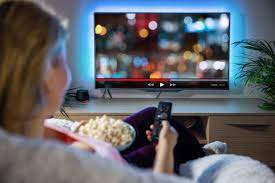

Television plays an essential role in our society today. It can entertain, inform and educate its viewers simultaneously, making it an all-in-one media platform that can help at any time of the day or night to meet any given need of its audience. While television has not changed much over the years regarding how it operates or looks, some new trends are occurring with televisions today, making them more appealing than ever to their viewers.
As their use has increased in television studios worldwide, LEDs have made it possible for directors and other creative professionals to do more with lights than ever before. For example, lighting professionals have continued to use LEDs during international live broadcasts that require inventive lighting techniques: such as Super Bowl 50 and The Oscars.
In addition, it’s possible to create various colors using LEDs—including pastels and fluorescent shades—and they are programmable to produce multiple effects such as chasing on set. These capabilities allow lighting designers to create new looks and enhance viewers’ experience. You can contact television lighting losangeles designers to learn more about how you can incorporate LED technology into your next production.
Technology helps create a mood on television that captivates viewers and adds realism to a scene. Achieving proper lighting is not just about ensuring you have enough lights but also ensuring each one casts a specific kind of light for maximum effect.
Smart LED mood lighting can help set a scene by adjusting its color temperature to match what’s happening on screen. That creates a natural look as if the sunlight were streaming through windows or illuminated from other sources like lamps or candles. That can be particularly effective when filming interviews where it’s essential to show how people react under different lighting conditions.
Since viewers have more viewing options today than ever, they’re increasingly turning to shows that give them an immersive viewing experience. From binge-watching series on Netflix to watching live sports events, it’s clear that being a part of a show is one way many viewers spend their free time. To provide viewers with an even more engaging experience, lighting professionals can incorporate technology into their workflows to create a sense of realism or ambiance.
For example, when shooting a scene for a nighttime drama, you might want to use dimmer packs and LED lights that look like car headlights—which would be challenging without some automation system. And suppose you’re filming in an interior space such as a home or office building. In that case, you might want to add accent lighting that makes certain areas pop while keeping others dark—again, something you could accomplish only through automated systems.
Elastic fusion is another technique used by lighting professionals to enhance viewer engagement; by blending multiple shots taken from different angles, you can create a seamless transition between scenes. All these techniques take some level of expertise and equipment but once mastered; they allow you to elevate your craft and deliver an exceptional viewing experience for your audience.
In addition to technical know-how, creativity is crucial to using technology in TV lighting effectively. If you find yourself stuck trying to decide how best to employ specific tools or technologies in your next project, try breaking down the elements that make up your desired effect into smaller pieces and brainstorm ways you can implement each piece. Determining what small parts need to come together often helps you see creative solutions you hadn’t previously considered.
With LED lighting infused with other technologies, it is possible to alter color temperatures in a brief period. Traditional light bulbs would take several minutes to change colors; therefore, designers used different light bulbs for different settings. Since LEDs don’t require a heating element, it’s possible to change them on-the-fly, and they are an ideal lighting source for studios. That means you can use different color tones without a new light setting whenever you want a different look and feel.
For example, suppose you wanted to create a warmer tone for one segment and then quickly change it to a calmer tone for another piece or even within that same segment (e.g., from tungsten white balance to daylight white balance). Then, your lighting designer could do so with ease.
The new era of television production has given rise to various styles and methods, each with specific tools. But today’s approachrequires technical skills, as one must consider numerous details before beginning production. The most important consideration is that directors want viewers to watch their show from start to finish. To achieve this goal, they must know how lighting affects a scene. Professional lighting designers consider both practical and aesthetic aspects when choosing to light for a set. Whether working on a sitcom or an action movie, technology plays an integral role in creating high-quality productions. It’s, therefore, crucial to hire an experienced lighting designer to ensure your vision comes across clearly on screen!
In the modern business landscape, maintaining robust connectivity across devices and equipment provides invaluable visibility…
It is normal to think of dark web monitoring from the perspective of the company…
The Evolution of Inventory Tracking RFID inventory management software is transforming how businesses track, manage,…
The Unexpected Costs of Unprotected Windshields Polaris Ranger windshields protection is more than just a…
Probably one of the best things people do to secure their finances is the purchase…
The iPhone 15 is still a great buy Released in 2023, the iPhone 15 brought…